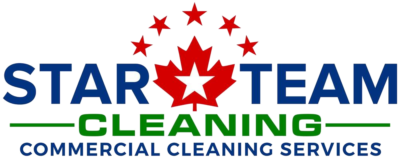Daycare Cleaning and Disinfection Services
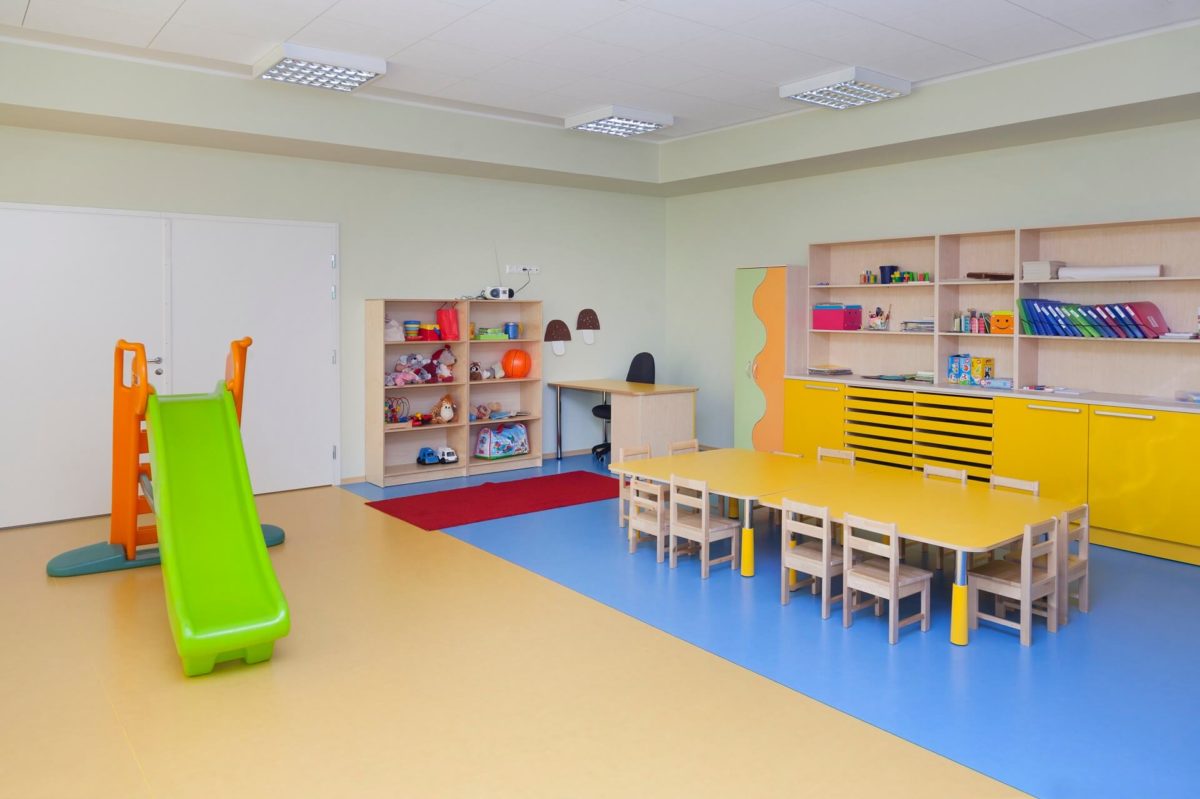
Guidelines for cleaning daycare centers are more comprehensive today than ever before. While some of the cleaning protocols for daycare centers are optional and only for your peace of mind, there are also a number of cleaning guidelines for daycare centers that are mandatory as more and more children are placed in daycare centers.
Everyday objects and surfaces that are frequently touched can be sources for the spread of infection, especially in daycare centers and schools in Canada. Such surfaces may include doorknobs, faucets, handrails, telephones, computer keyboards, elevator buttons, work surfaces, and shared sports equipment or toys. These surfaces and items can easily become contaminated with viruses or bacteria that can be transmitted from one person to another. Developing policies and procedures for cleaning and disinfecting is important to prevent the spread of infections in your daycare center or school.
We know that cleaning is the physical removal of impurities from a surface. Cleaning with soap or detergent and water removes organic material such as food, body fluids, faces, or dirt from surfaces. Soap or detergent residue must be rinsed off before disinfection to prevent neutralization of some disinfectants in daycare centers.
On the other hand, disinfection must be performed after cleaning. Disinfection inactivates or kills microorganisms (germs) that are on surfaces and cannot be removed by cleaning. A variety of disinfectants may be used on a regular basis in a daycare facility. In outbreak situations, a different disinfectant may be needed. You can discuss this with star team cleaning services if needed.
Cleaning and Disinfecting (Daycare Handbook)
Keeping your daycare clean can help prevent and control the spread of infectious diseases. Build cleaning and disinfection into your daily routine and train your staff regularly. For this reason, we have compiled a list below:
- Cleaning of the daycare center
- Disinfection of the daycare center
- Cleaning and disinfection of toys in the daycare center
- Sensory play in the daycare center
- Routine cleaning and disinfection of the daycare center
Cleaning of the Daycare Center
Cleaning is the first important step in a cleaning and disinfection process in daycare centers. Without cleaning, dirt or organic matter can interfere with the ability of the disinfectant to kill pathogens present on surfaces. When cleaning multiple surfaces, move from the least soiled to the most soiled areas to reduce the risk of contamination carryover. Proper daycare cleaning involves three steps:
- Wash all surfaces with soap and water and remove dirt and organic material by rubbing
- Rinse with clean drinking water
- Air dry or use a disposable paper towel
Disinfection of the Daycare Center
A disinfectant, a special chemical generally applied to reduce pathogen to safe level. There are many different products available, including some disinfectants that double as cleaning agents. The Star Team Cleaning Consider all factors before choosing the most appropriate product for your center.
Some disinfectants can be obtained from a supplier in a formula premixed to the desired concentration. These should be used as directed. Concentrated products are a concentrated formula that you must mix with water in a specific ratio indicated on the product label.
If you are responsible for mixing and preparing the disinfectant solution, you must use appropriate test strips to verify that the solution contains the correct concentration. The correct concentration is important for safe and proper disinfection in daycare.
Contact time is the time the disinfectant must remain wet on a surface to allow adequate disinfection. If the required contact time is not achieved, surfaces will not be adequately disinfected. Always select the appropriate contact time for the intended activity or level of disinfection.
The disinfectants you use in your daycare center should have a drug identification number on the product label. A drug identification number means that Health Canada considers the product safe and effective for its intended use as a disinfectant.
Expiry date
If star team uses a disinfectant, pay attention to the expiration date. Using a product after its expiration date may compromise its effectiveness. Household bleach does not have an expiration date, but bleach-based disinfectants do.
Storage Conditions
When refilling chemical bottles, label them properly according to the requirements of the Workplace Hazardous Materials Information System. Keep all disinfectants in a safe place:
- Out of reach of children
- According to the manufacturer’s instructions
- Protected from direct sunlight
- At moderate temperature. Avoid very hot or cold conditions.
Establish written procedures that specify the frequency and method for cleaning and disinfecting high-contact surfaces. It is recommended that cleaning and disinfection protocols be used to track the cleaning and disinfection of surfaces.
Hand hygiene
- Provide alcohol-based hand sanitizer and/or a hand-washing station near play areas
- Encourage and help children wash their hands with alcohol-based hand sanitizer or soap and water before and after each play session. Supervise children when they use alcohol-based hand lotion.
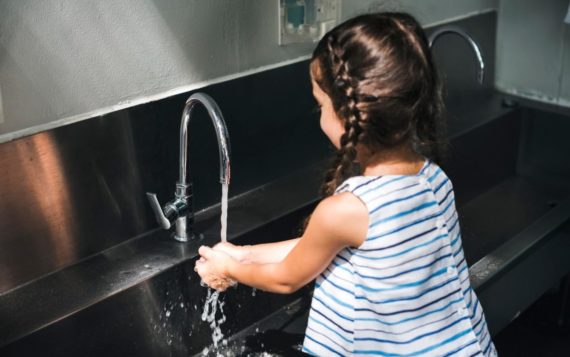
Cleaning and Disinfection of Toys in the Daycare Center
Establish written procedures that determine the frequency and method of cleaning and disinfecting toys and assign responsibilities. Select the size of stuffed toys to fit in the washer and dryer. Adhere to the frequency of cleaning and disinfecting:
- Toys for young children at least weekly at least daily.
- Any toy that comes in contact with a child’s mouth must be immediately removed from the play area and cleaned and disinfected before being used again.
- Do not wash toys with dishes or silverware.
- If you use a disinfectant, rinse the toy thoroughly before use. Allow the toy to air dry before storing.
- Make sure the disinfectant used is safe and appropriate for its intended use and that the manufacturer’s dilution instructions are followed.
- Make sure shared toys can be easily cleaned, disinfected or washed.
- Do not use bath toys that retain water.
- Check toys regularly for damage or cracks. Throw away damaged toys immediately. They can prevent proper cleaning and disinfection and pose a safety hazard.
- Provide a container to separate dirty toys from clean toys.
- Store clean toys so that they cannot become contaminated.
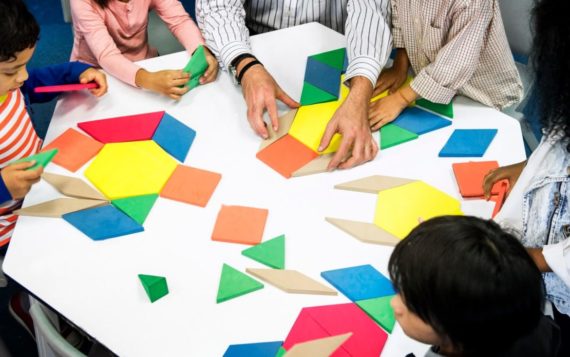
Sensory Play in the Daycare Centers
Set guidelines for sensory play activities.
- Refrain from sensory play with children who have open sores, cuts, colds, or runny noses.
- Stop sensory play if an outbreak is detected at your facility until the outbreak is declared over.
- Always washing the hands before and after all types of playing activities.
- Provide a tight-fitting lid for the play table.
- Clean and disinfect the play table and toys when changing materials.
- Change dry play materials weekly or more often if they are dirty.
- Change play sand monthly. Avoid using sand that contains silica. Silica can cause or worsen respiratory problems.
- If you use dry food, make sure it is not eaten or put in children’s mouths. Throw away wet food products.
- Clean and disinfect the water basin and toys at least once a day for full-day programs and after each group for half-day programs.
- Use municipal (drinking) water.
- Replace sand as often as necessary to keep it visibly clean and free of contaminants.
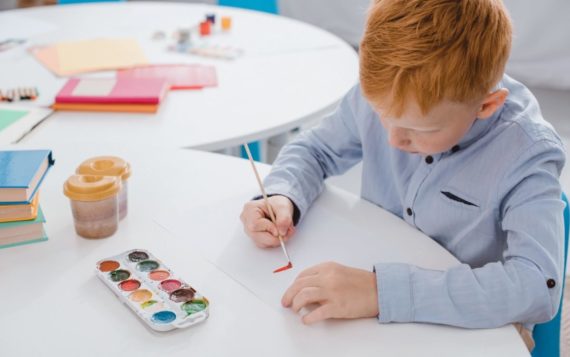
Routine Cleaning and Disinfection of the Daycare Center
The frequencies indicated are the minimum requirements for times when there are no outbreaks. Star Team cleaning facilities maintain clean and sanitary conditions at all times.
The Star Team Daycare Cleaning Services
The Star Team Daycare is responsible for all types of cleaning and maintenance services. Rely on our cleaning team to take care of your daycare. Trust us and let us do the work while you focus on your daily life. The Star Team guarantees you the best daycare cleaning services! Contact us today to discuss the scope of work needed for your daycare centers.
